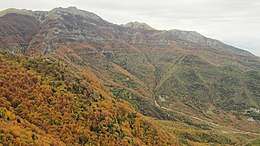Pangaion Hills
The Pangaion Hills (Greek Παγγαίο Pangéo; ancient Greek: Καρμάνιον Karmánion, Παγγαῖος Pangaîos, m., Παγγαῖον [ὄρος] Pangaîon [óros] oder Πάγγαιον [ὄρος] Pángaion [óros], n.; Homeric name: Nysa; also called Pangaeon, Pangaeum) are a mountain range in Greece, approximately 40 km from Kavala. The highest elevation is 1,956 m and the mountaintop name is Koutra. The Aegean Sea lies to the south and the plains of Philippi-Kavala to the north. The mountain range covers the southeastern portion of the Serres regional unit as well as northwestern part of the Kavala regional unit which includes the bigger part of the hills.
| Pangaion Hills | |
|---|---|
 Snow-covered Pangaion hills from the forests of Kavala | |
| Highest point | |
| Peak | Koutra |
| Elevation | 1,956 m (6,417 ft) |
| Prominence | 1,773 m (5,817 ft) [1] |
| Coordinates | 40°55′01″N 24°04′58″E |
| Geography | |
| Country | Greece |
| Regional unit | Kavala and Serres |
Ottoman Turks called the hills Pınar Dağ ("Spring Mount"). The Bulgarian name is Kushnitsa (Кушница) or Kushinitsa (Кушиница).
Description

The hills are directly across a fertile plain from the ancient city of Philippi, they are located in the ancient country of Sintice, between the Strymon and the Xiropotamos rivers and are covered in oriental plane and chestnut trees. Towns found in the Pangaion hills include Nikisiani and Palaiochori which are agricultural in nature and grow mainly grain and tobacco. The town of Palaiochori boasts the ruins of an ancient castle on a peak overlooking the town. Gold and silver were mined in the ancient times. The Athenian tyrant Pisistratus was exiled in the middle of the mountain. It was with the rich gold and silver available in the region in mind that the Athenians sent out a colony in 465 in an area known as the Nine Roads (Ennéa Hodoí). The colonists were massacred by nearby Thracians and the colony was abandoned, though the Athenians would return to the area with their colony at Amphipolis.
Pangaion is very often referred by ancient Greek and Latin sources. It was famous for silver and gold mines, as well as for shipyard wood and the oracle of Dionysus.[2]
The municipality of Pangaio is named after this mountain range and the seat of the municipality is Eleftheroupoli.
References
- http://peaklist.org/WWlists/ultras/EuroCoreP1500m.html
- D. C. Samsaris, Historical Geography of Eastern Macedonia during the Antiquity (in Greek), Thessaloniki 1976 (Society for Macedonian Studies), pp. 15, 36–41 (digitized version Archived 2017-04-24 at the Wayback Machine). ISBN 960-7265-16-5.
| Wikivoyage has a travel guide for Pangaion Hills. |